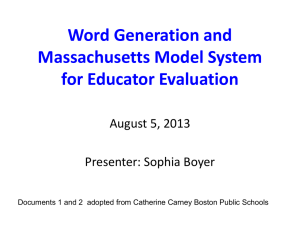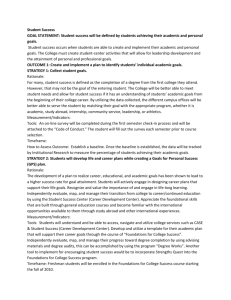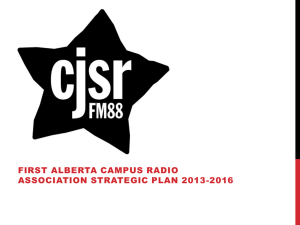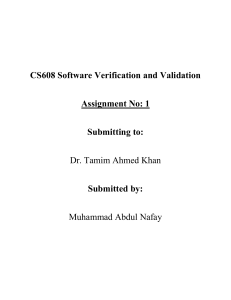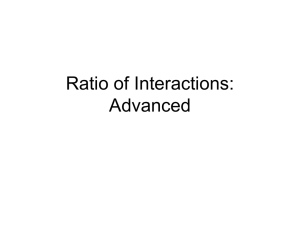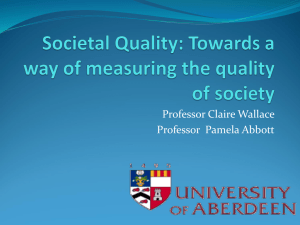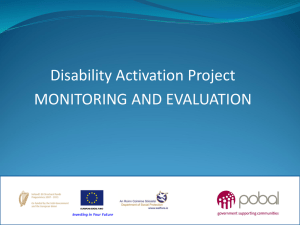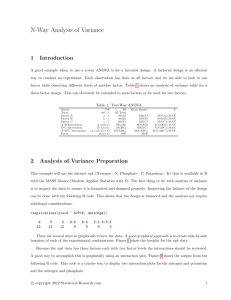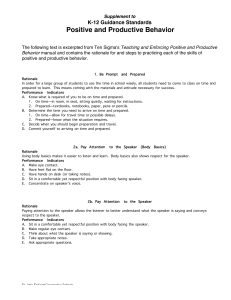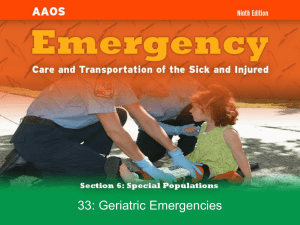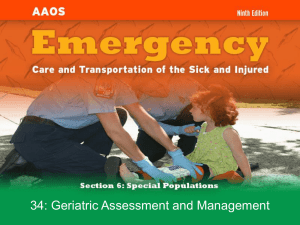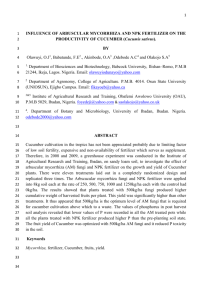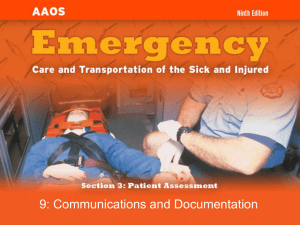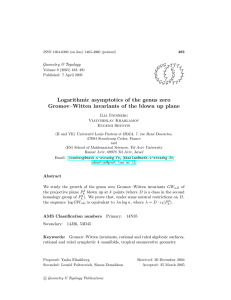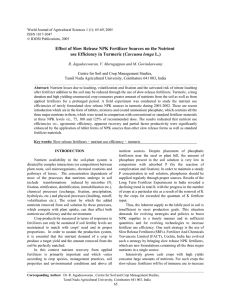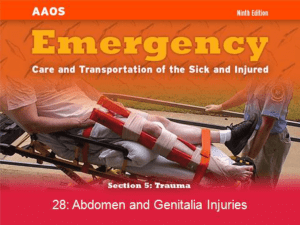Pupil Learning and Thinking Skills
advertisement
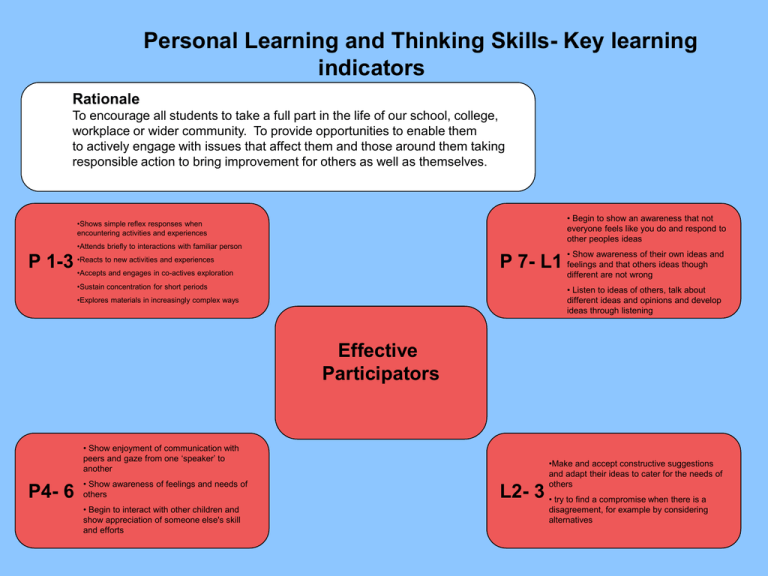
Personal Learning and Thinking Skills- Key learning indicators Rationale To encourage all students to take a full part in the life of our school, college, workplace or wider community. To provide opportunities to enable them to actively engage with issues that affect them and those around them taking responsible action to bring improvement for others as well as themselves. • Begin to show an awareness that not everyone feels like you do and respond to other peoples ideas •Shows simple reflex responses when encountering activities and experiences •Attends briefly to interactions with familiar person P 1-3 • Show awareness of their own ideas and P 7- L1 feelings and that others ideas though •Reacts to new activities and experiences •Accepts and engages in co-actives exploration different are not wrong •Sustain concentration for short periods • Listen to ideas of others, talk about different ideas and opinions and develop ideas through listening •Explores materials in increasingly complex ways Effective Participators • Show enjoyment of communication with peers and gaze from one ‘speaker’ to another P4- 6 • Show awareness of feelings and needs of others • Begin to interact with other children and show appreciation of someone else's skill and efforts •Make and accept constructive suggestions and adapt their ideas to cater for the needs of others L2- 3 • try to find a compromise when there is a disagreement, for example by considering alternatives Personal Learning and Thinking Skills - Key learning indicators Rationale To encourage our students to think creatively enabling them to explore ideas, find solutions and try different ways to tackle a problem. We will focus on further developing their skills which will equip them to work with others in an imaginative, creative way, providing value to their thoughts by following ideas through. •Participate with support •Shows positive response to attention •May use creative work to express feelings •Shows some frustration if an enjoyable activity stops P1- 3 •Makes similar responses several times P7- L1•Discuss an idea with a partner •Develop ideas through listening to peers •Responds with displeasure •Seek attention through eye contact or action Creative Thinkers •Selects materials to play with P4- 6 •Looks at the work of others and shows satisfaction and displeasure •Explores a new environment or equipment •Lead a group in drama or role play •Draft their ideas and consider L1- L3 alternatives Personal Learning and Thinking Skills - Key learning indicators Rationale To encourage our students to monitor their own performance and progress. We will provide opportunities which enable them to further their potential by setting goals and targets with clear criteria for success. Students will be encouraged to evaluate their performance inviting feedback from others to further inform future learning. •Focus their attention giving intermittent reactions to certain people, events, objects •Listens to why what they have done is wrong or right •Gives intermittent reactions – e.g. – vocalises to self/showing awareness of a social activity P1- 3 •Realise what they do affects others P7-L1•Identify a new skill they have •Performs actions by trial and improvement •Remember learned responses over short periods of time developed •Observe the results of their actions with interest •Apply potential solutions systematically to problems Reflective Learners •Expresses feelings towards a person, action or activity P4- 6 •Aware of approval and disapproval •Respond to adult reaction to own action L1- 3 •Make constructive suggestions and accept constructive suggestions from others •Identify an action of their own that was good or wrong and explain why Personal Learning and Thinking Skills - Key learning indicators Rationale To encourage our students to interpret, process and evaluate information in their investigations, ultimately planning what to do and how to go about it. We will provide opportunities which encourage them to become independent enquirers enabling them to take informed, well-reasoned decisions, recognising that others have different beliefs and attitudes. •Quietens at familiar voice or sound stimuli •Begin to show an awareness that not everyone feels like they do. •Shows pleasure/displeasure P1-3 •Asks questions related to topic. •Reaches out to request attention P7-L1•Discuss with an adult the task to be •Turns head away to indicate enough •Indicate they want to continue an activity completed. •Respond to options and choices with actions and gestures Independent Enquirers • Attempts to begin a specific activity they enjoy independently. P4-6 •Asks for specific help with work related problems • Discuss with an adult how to approach a problem. •Identify qualities in self and others L2-3 that they admire. •Identify sources of information. Personal Learning and Thinking Skills - Key learning indicators Rationale To encourage our students to work confidently with others, to be adaptive in working in different situations and taking responsibility for their actions and choices they make. They will demonstrate the ability to listen, respect and consider the views of others. We aim to encourage our students to demonstrate confidence in collaborative working. •Has brief periods when they are ready to focus their attention P1-3 • Make relevant contribution to group instructions with support •Show emerging awareness of activities and experiences •Respond consistently to familiar people with team and contribute P7- L1 •Co-operate appropriately to achieving a specific aim •Recognise familiar people – e.g. – vocalising or gesturing in a particular way •Show awareness of needs and opinions of others within the team •Communicates intentionally •Participate in shared activities with less support Team Workers • Greet peers within working group and communicate with them through appropriate means P4- 6 •With support work with at least one peer and listen and respond to others communication without interruption •With support share resources and take turns at different activities and roles • Make meaningful contributions to group planning, monitoring and evaluation of the task ability to work within their team L2- 3 •Demonstrate without direct adult supervision Personal Learning and Thinking Skills - Key learning indicators Rationale To encourage our students to organise themselves and develop their skills within the areas of personal responsibility, initiative, creativity and enterprise. The aim will be towards self improvement and extending learning which will enable them to embrace and cope with change, responding to new priorities and challenges. • •Gives intermittent reactions to stimuli P1- 3 •Shows signs of intentional communication • Identify and locate resources required for an activity •Begins to respond consistently to new activities and experiences • Show interest in new experiences, new methods and new materials P7-L1 • complete tasks showing awareness of a •Communicate consistent preferences and affective responses timetable or schedule and begin to make decisions about what to do next •Request events, activities and interaction •Remember learned responses over more extended periods of time Self Managers •Ask for help with word or gesture P4- 6 •Ask for specific help with work related problem •Willing to try using unfamiliar material • Sate and explain preferences and plan how they will achieve their goals •Work independently with periods of sustained and take a pride in the L2- 3 concentration presentation of completed work
